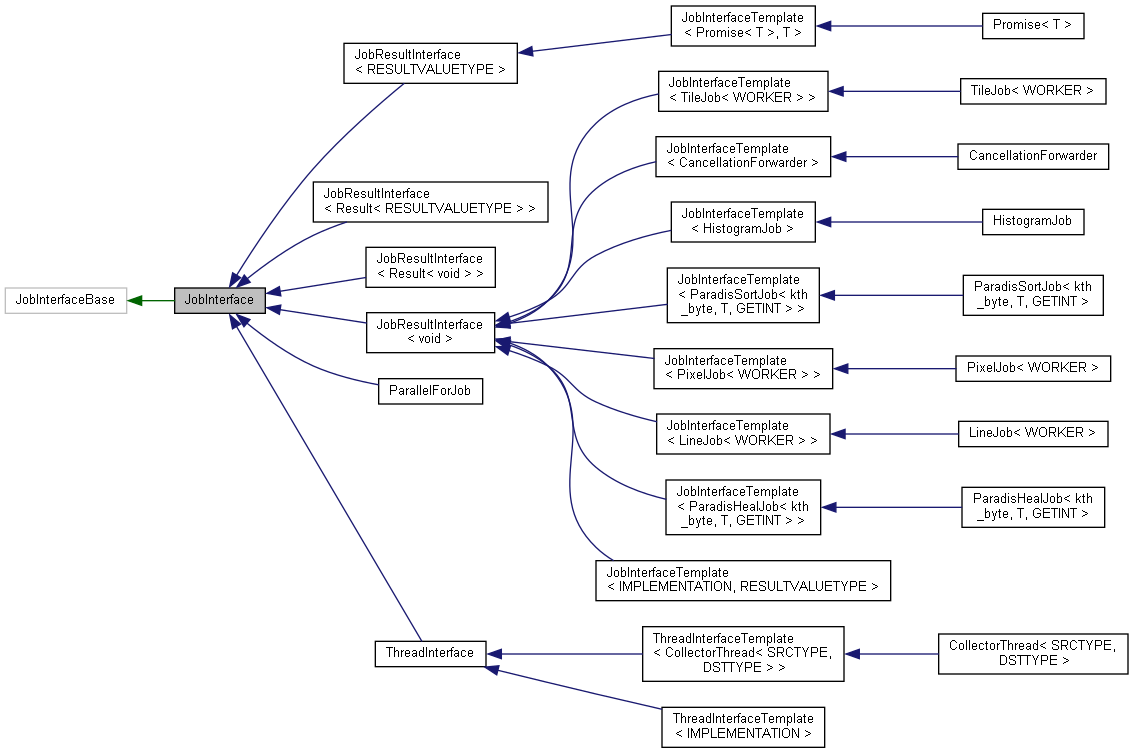#include <job.h>

Detailed Description
A job is a threaded entity that can be enqueued or added to a group. A JobRef is similar to a ThreadRef but all jobs on the same queue (JobQueueRef) share a set of worker threads whereas each ThreadRef has its own private thread.
Once a job has been enqueued it will be executed as soon as a worker thread of the specified queue is available. In general jobs must be independent of each other. The order and timing of the execution as well as the chosen worker thread are completely up to the job system. It keeps the worker threads as busy as possible until a queue is (temporarily) empty.
One way to create a job is to inherit from JobInterface/JobInterfaceTemplate and to implement operator (), for example
A job is reference counted. A typical application might involve creating a job with Create() (or NewObj) and enqueueing it. Your job will automatically be deleted once it is not referenced anymore. The same applies to jobs that are added to a group.
Instead of creating an object that is derived from JobInterface you may also enqueue a lambda expression which can have the advantage of writing code that is easier to manage because the parallelized tasks appear in sequential order in the source code.
Jobs are not allowed to sleep at all. They may only wait for jobs or groups they have created and enqueued (otherwise this would easily dead-lock). See Wait() or GetResult() for more details.
- Note
- By default the job system assumes that all jobs of a group share the same dependencies (because they operate on the same data) and single jobs share dependencies when they use the same code (again because they likely use the same data). Furthermore jobs enqueued to the main thread queue are assumed to have a UI dependency by default. For the unlikely case of requiring custom dependencies
const JobDependencyGroupInterface* GetDependencyGroup() constcan be implemented by your jobs to return a shared dependency group.
Static Public Member Functions | |
| static Int | GetCurrentWorkerThreadIndex () |
| static Int | GetCurrentThreadCount () |
| static Bool | IsCurrentJobCancelled (const JobInterface *optionalJob=nullptr) |
| static JobStatusInterface * | GetCurrentJob () |
Private Member Functions | |
| MAXON_DISALLOW_COPY_AND_ASSIGN (JobInterface) | |
Static Private Member Functions | |
| template<typename IMPLEMENTATION > | |
| static IMPLEMENTATION & | GetWorker (const JobInterface *job) |
| template<typename IMPLEMENTATION > | |
| static void * | DestructWorker (const JobInterface *self) |
| template<typename IMPLEMENTATION > | |
| static const ErrorInterface * | RunWorker (const JobInterface *job) |
| template<typename T > | |
| static const JobDependencyGroupInterface * | GetWorkerDependencyGroupImpl (const JobInterface *job, std::false_type *) |
| template<typename T > | |
| static const JobDependencyGroupInterface * | GetWorkerDependencyGroupImpl (const JobInterface *job, std::true_type *) |
| template<typename IMPLEMENTATION > | |
| static const JobDependencyGroupInterface * | GetWorkerDependencyGroup (const JobInterface *job) |
| template<typename IMPLEMENTATION > | |
| static void * | GetWorkerOptions (const JobInterface *self, Int selector, void *param) |
| static CoreJobGroup & | GetCoreJobGroup (JobGroupInterface *group) |
Friends | |
| class | StrongRefHandler |
| template<typename > | |
| struct | ObservableFinishedBase |
| template<typename > | |
| struct | ObservableCancelledBase |
| class | JobStatusInterface |
| class | JobGroupInterface |
| template<typename > | |
| class | StaticJobGroupInterface |
| class | TimerInterface |
| template<typename FN > | |
| auto | ExecuteOnMainThread (FN &&fn, WAITMODE waitMode, TimeValue wait) -> decltype(fn()) |